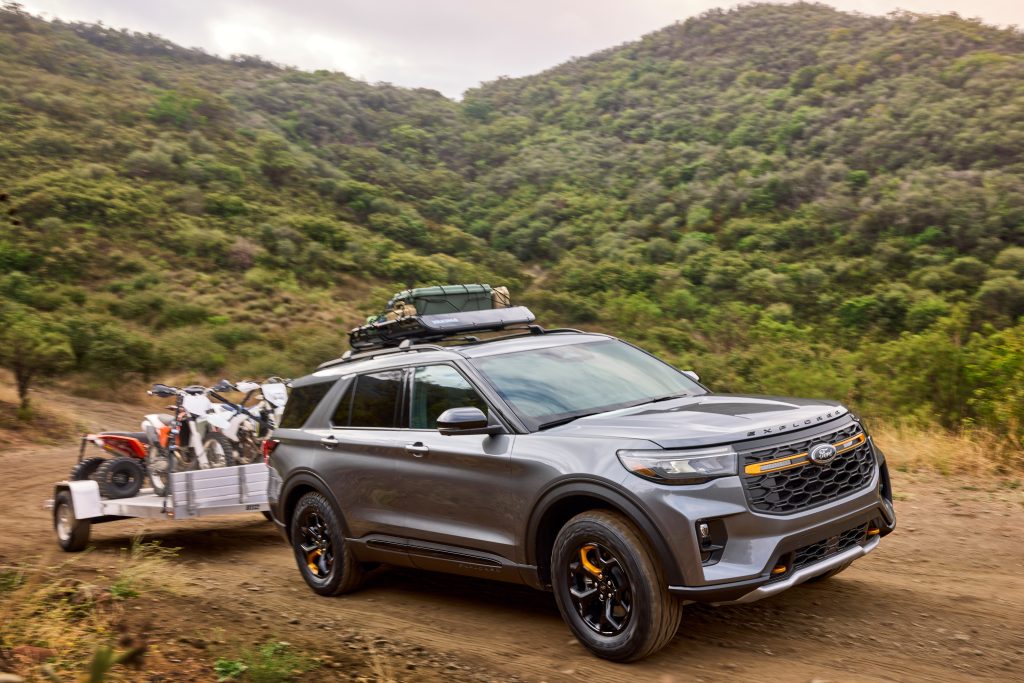
If you drive a Ford Explorer, the right oil is more than a part number. It is the protection plan for your engine. At Jim Burke Ford, we follow Ford’s factory guidance for every model year and engine, then translate that into clear, practical recommendations you can trust. Below you will find the correct oil viscosity and Ford specification for every Explorer from newest to oldest, grouped when the guidance is the same. When in doubt, your owner’s manual and oil filler cap are the definitive sources, and we have cited Ford’s manuals and Motorcraft’s official oil chart throughout.
2026 Explorer
For 2026, Ford specifies SAE 5W-30 for every Explorer engine, with SAE 0W-30 allowed in extremely cold climates.
• 2.3L EcoBoost I-4: SAE 5W-30 meeting WSS-M2C971-A1. Alternative for extreme cold: SAE 0W-30 meeting WSS-M2C973-A1.
• 3.0L EcoBoost V6: SAE 5W-30 meeting WSS-M2C971-A1. Alternative for extreme cold: SAE 0W-30 meeting WSS-M2C973-A1.
• 3.3L V6 and Hybrid: SAE 5W-30 meeting WSS-M2C971-A1. Alternative for extreme cold: SAE 0W-30 meeting WSS-M2C973-A1.
2020-2025 Explorer
Sixth-generation Explorers use different oils by engine.
• 2.3L EcoBoost I-4: SAE 5W-30 meeting WSS-M2C946-B1 or later.
• 3.0L EcoBoost V6 including ST: SAE 5W-30. Ford lists 0W-30 as an alternative for extreme cold in capacities pages.
• 3.3L V6 and Hybrid: SAE 5W-20 meeting WSS-M2C945-B1, with 0W-20 allowed for extreme cold.
Motorcraft’s official quick-reference chart corroborates these engine-by-engine recommendations across 2020-2025.
2016-2019 Explorer
Fifth-generation updates changed turbo engine sizes, not the oil fundamentals.
• 2.3L EcoBoost I-4: SAE 5W-30.
• 3.5L V6 non-turbo: SAE 5W-20.
• 3.5L EcoBoost V6: SAE 5W-30.
2011-2015 Explorer
The first unibody Explorer introduced EcoBoost power alongside the 3.5L V6.
• 2.0L EcoBoost I-4: SAE 5W-30.
• 3.5L V6 non-turbo: SAE 5W-20.
• 3.5L EcoBoost V6: SAE 5W-30.
2006-2010 Explorer
Fourth-generation models used a 4.0L SOHC V6 or a 3-valve 4.6L V8.
• 4.0L V6: SAE 5W-30.
• 4.6L V8: SAE 5W-20.
2002-2005 Explorer
Third-generation models carried over the 4.0L SOHC and added a 4.6L V8.
• 4.0L V6: SAE 5W-30.
• 4.6L V8: SAE 5W-20.
2001 Explorer
Final year of the second generation with multiple engines.
• 4.0L V6: SAE 5W-30.
• 5.0L V8: SAE 5W-20.
1995-2000 Explorer
Second-generation models generally specify SAE 5W-30 in the owner’s guides. Examples include 1996, 1999 and 2000 manuals.
1991-1994 Explorer
Early Explorers were also specified for SAE 5W-30 in period Ford literature. While the earliest PDFs are limited online, the pattern continues from mid-90s manuals and Ford service guidance of the era.
Why the spec and the viscosity both matter
Ford’s recommendation is a combination of viscosity and a Ford specification number. Using an oil that matches both protects timing components, turbochargers where equipped, and emissions systems. For late-model Explorers you will see spec codes like WSS-M2C971-A1 or WSS-M2C946-B1 in the owner’s manual and Motorcraft charts. We use these specs every day in our shop and stock the correct Motorcraft oils for each generation.
Cold weather alternatives
Ford often allows a lower winter grade in extreme cold to improve cranking and flow, for example 0W-30 in current models and 0W-20 for 2020-2025 3.3L engines. Follow the alternative grades exactly as listed in your manual if you operate in very low temperatures.
Conclusion
Choosing the correct oil for your Explorer is straightforward when you match your model year and engine to Ford’s official guidance. Jim Burke Ford’s Service Center uses the right Motorcraft oil and filter for each Explorer, from classic 90s trucks to today’s turbocharged and hybrid models. If you are unsure which engine you have or want us to handle the service end-to-end, we are ready to help.



